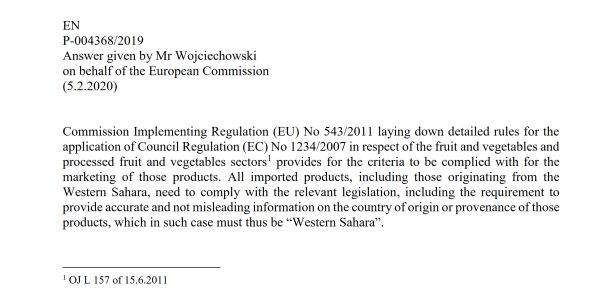
The Netherlands, which is against the inclusion of Western Sahara products in EU-Moroccan trade, seems unable to respect the decision from the Court of Justice from December 2015.
How can the European Union uphold the judgment of the Court of Justice of the European Union (CJEU), stopping all imports from agricultural and fish products from Western Sahara into the EU?
That is the question that follows from a statement of the Dutch government, asserting that it is unknown whether tomatoes from Western Sahara have been imported into the Netherlands, after the aforementioned judgment of 10 December 2015.
The Dutch government has been very clear on not including Western Sahara in deals with Morocco. This both applies to the EU trade agreement, as well as on its bilateral relations with Morocco.
But honoring the decision by the Court of Justice from 10 December 2015, excluding the territory of Western Sahara from the EU-Moroccan trade pact, seems impossible, even for the Dutch.
“The Netherlands does not have any information about the origin of Morocco’s export tomatoes. Morocco doesn’t have a system to register origin within Morocco, and Morocco does not differentiate between Morocco and the Western Sahara”, the Dutch Ministry of Foreign Affairs wrote on 20 April to Stichting Zelfbeschikking West-Sahara, who had inquired whether import was still taking place post-judgment.
On 10 December 2015, the CJEU issued a judgment in the case of the Saharawi liberation movement, the Frente Polisario, against the Council of the European Union, over the so-called EU-Morocco agriculture agreement. That agreement entered into force in October 2012, and allowed for increased volumes of agricultural and fisheries products originating in Morocco to enter the Union. But the agreement was so vague in terms of its territorial application that it allowed for the area of Western Sahara that has been under Moroccan occupation since 1975, to be included in the deal. As a result, products covered by the deal that originated in Western Sahara, not in Morocco, could enter the Union as if they were from Morocco.
The CJEU put a stop to that practice, by cancelling the agreement in its application in Western Sahara.
The EU institutions are thus facing the obligation to make sure that the judgment is implemented. But the answer given by the Dutch government questions the EU’s ability to do so.
Dutch government repeats: Western Sahara products are not from Morocco
The new Dutch government has reiterated the position of their predecessors: Products from Western Sahara cannot enter the EU market labelled as from Morocco.
EU Commission backtracks on labelling Western Sahara goods
What is EU's position on labelling of products from occupied Western Sahara? The EU Commission has now for the third time published a response to a parliamentary question on the matter, but the latest version fails to address the question.
Why does this EU statement keep disappearing?
A clarification by the EU Commission on labelling of products from Western Sahara was published, then removed, then published again and has now been removed again from EU websites.
EU reaffirms: Western Sahara products to be labelled as such
Two weeks ago, the EU Commission announced that products from Western Sahara should be labelled accordingly, only to withdraw that statement the very next day. Today, the Commission reaffirms its original position.



